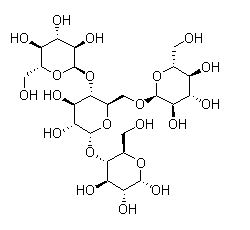Glycogen
| CAS No. | 9005-79-2 | Cat. No. | BCP19030 |
| Name | Glycogen | ||
| Synonyms | |||
| Formula | C24H42O21 | M. Wt | 666.58 |
| Description | Glycogen is a highly-branched polymer of about 30, 000 glucose residues and has a molecular weight between 106 and 107 daltons (4. 8 million approx. ). Most of Glc units are linked by alpha-1, 4 glycosidic bonds, approximately 1 in 12 Glc residues also makes -1, 6 glycosidic bond with a second Glc which results in the creation of a branch. Glycogen only has one reducing end and a large number of non-reducing ends with a free hydroxyl group at carbon 4. The glycogen granules contain both glycogen and the enzymes of glycogen synthesis (glycogenesis) and degradation (glycogenolysis). The enzymes are nested between the outer branches of the glycogen molecules and act on the non-reducing ends. Therefore, the many non-reducing end-branches of glycogen facilitate its rapid synthesis and breakdown. In hypoglycemia caused by excessive insulin, liver glycogen levels are high, but the high insulin level prevents the glycogenolysis necessary to maintain normal blood sugar levels. Glucagon is a common treatment for this type of hypoglycemia. Glycogen is a polysaccharide that is the principal storage form of glucose (Glc) in animal and human cells. Glycogen is found in the form of granules in the cytosol in many cell types. Hepatocytes (liver cells) have the highest concentration of it - up to 8% of the fresh weight in well fed state, or 100 to 120 g in an adult - giving liver a distinctive, 'starchy taste'. In the muscles, glycogen is found in a much lower concentration (1% of the muscle mass), but the total amount exceeds that in liver. Small amounts of glycogen are found in the kidneys, and even smaller amounts in certain glial cells in the brain and white blood cells. | ||
| Pathways | Others Pathway | ||
| Targets | Others | ||
Structure

Part data of this page collected from the open network resources, so Biochempartner can not guarantee its accuracy.
For product details of different batches, please contact our Customer
- Service & Tech Support:orders@biochempartner.com
- Website:www.biochempartner.com
Products are for research use only and not for human use. We do not sell to patients.
